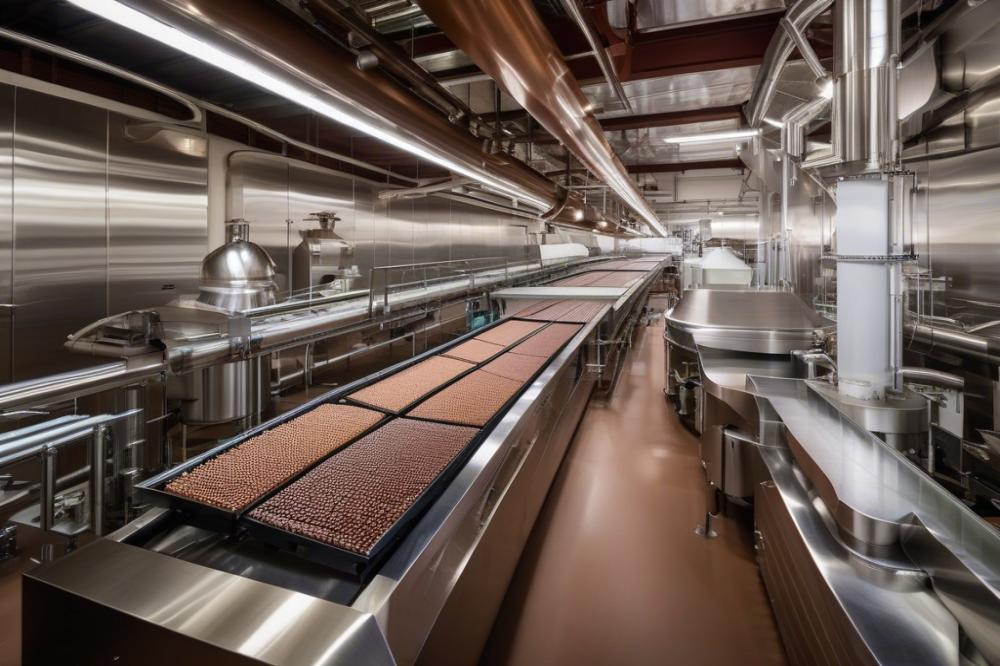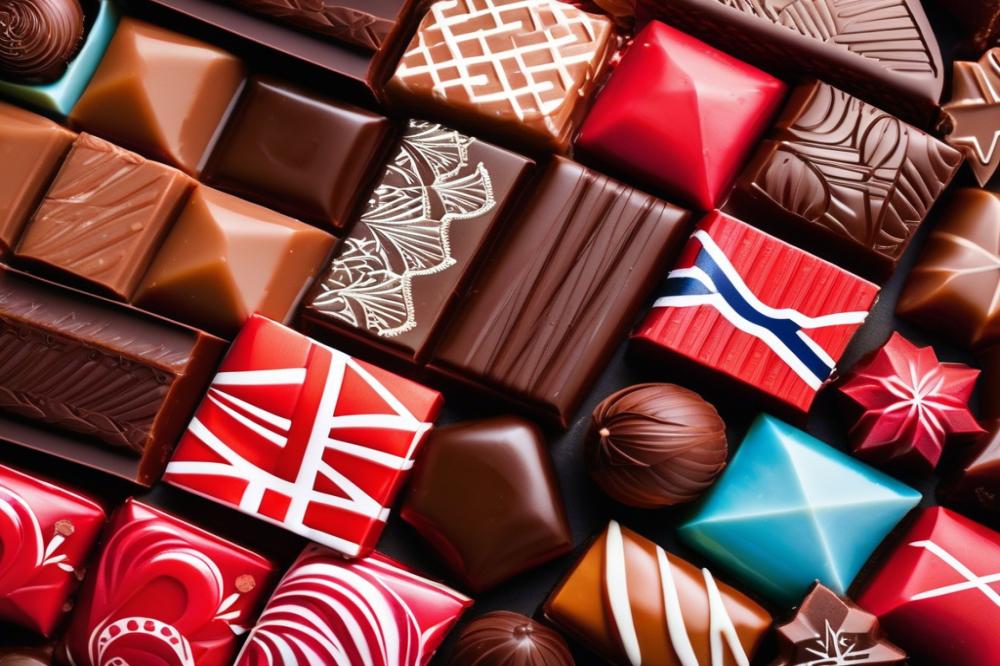Introduction
The growth of chocolate production in the USA has been impressive. Over the past few decades, the demand for chocolate has surged. This surge has driven manufacturers to explore new methods to enhance production. As a result, traditional practices are being challenged by innovative technologies. Chocolate lovers now enjoy a variety of products, from luxury brands to mass-market options.
One major development is the integration of artificial intelligence in chocolate manufacturing. smart agriculture techniques are being adopted to improve cocoa farming. AI enables farmers to analyze soil quality and optimize crop yield. Data analytics is transforming how suppliers manage their resources. Machine learning algorithms can forecast trends, helping manufacturers prepare for market demands.
AI in Food Industry has become essential for ensuring quality control. Automation is now commonplace in factories, streamlining operations. This technology helps in flavor enhancement, allowing companies to experiment with different ingredients. Supply chain optimization also benefits from these advancements, making it easier to track products from farm to shelf.
A significant aspect of using AI is its role in sustainability. By using data, companies can identify wasteful practices and develop better strategies. This focus on eco-friendly methods not only preserves resources but delights conscious consumers. Through innovation and technology, the chocolate industry is evolving to meet modern challenges.
Artificial Intelligence in Chocolate Production

Artificial intelligence refers to computer systems designed to simulate human intelligence. This technology can perform tasks that usually require human reasoning, like learning and problem-solving. By utilizing AI, chocolate manufacturers are changing how they create and distribute their products.
AI Technologies in the Industry
Machine learning plays a significant role in chocolate manufacturing. It allows computers to analyze vast amounts of data quickly. Data analytics helps companies understand trends and consumer preferences. These insights can lead to more effective marketing strategies.
In smart agriculture, AI tools help farmers monitor cocoa crops. Sensors collect data on soil conditions, moisture levels, and weather. This information enables farmers to make better decisions, improving yields and reducing waste. Automation also streamlines processes, minimizing labor costs in production facilities.
The Impact on Production Stages
Various stages of chocolate production benefit from AI applications. During the quality control phase, AI algorithms can detect defects in chocolate products. This ensures a higher standard of the final product. Flavor enhancement is another area where AI shines. It can predict which combinations of ingredients will result in the best taste.
Supply chain optimization is crucial for manufacturers. AI helps track inventory and shipments. This leads to lower costs and faster delivery times. Sustainability is also a focus, as AI encourages eco-friendly practices. By analyzing patterns, manufacturers can make choices that protect the environment.
Innovation is at the heart of integrating AI into chocolate production. As technology evolves, so do the possibilities. This blend of tradition and modernity positions the chocolate industry for a bright future.
Smart Agriculture and Sustainable Sourcing

Artificial Intelligence plays a significant role in modern cocoa farming. It helps farmers cultivate cocoa more effectively and sustainably. Sensors and drones gather data on soil health, moisture levels, and crop conditions. Farmers can then use this data analytics to make informed decisions about their crops.
The benefits of smart agriculture are clear. Cocoa yield can increase when farmers implement precision farming techniques. Using machine learning, they can analyze historical weather patterns and predict future conditions. This creates opportunities for better planning and reduces crop losses. Moreover, the quality of cocoa beans can improve through these innovative methods. Farmers can monitor growth conditions closely, adjusting their techniques based on real-time feedback.
Sustainability practices are also enhanced through the use of technology in sourcing cocoa. AI-driven supply chain optimization helps companies track their cocoa beans from farm to factory. This transparency is vital for maintaining ethical practices. Knowing where cocoa comes from allows manufacturers to support farms that follow sustainable methods. Automation in processing can reduce waste, ensuring more cocoa is used efficiently.
Flavor enhancement is another exciting aspect. By analyzing data from different cocoa varieties, companies can create unique chocolate products that cater to consumer preferences. The integration of AI in chocolate manufacturing paves the way for innovations that benefit both farmers and consumers. Strong impacts on the entire industry are possible through these advancements in smart agriculture and sourcing practices.
Supply Chain Optimization
How AI Improves Logistics in Chocolate Production
Artificial Intelligence plays a critical role in improving logistics within chocolate manufacturing. By applying machine learning algorithms, companies can predict the best times to source ingredients. Accurate forecasts lead to timely deliveries. This happens through the analysis of historical data. AI can sense patterns in shipping and demand. With improved transportation routes, firms save time and money. Faster delivery contributes to fresher products.
Role of Data Analytics in Forecasting and Inventory Management
Data analytics is essential for effective forecasting. Chocolate producers utilize this technology to track inventory levels. Understanding when to replenish stock prevents shortages. Automated systems can alert managers as supplies dwindle. Predictive models consider market trends and consumer preferences. This results in an agile inventory system. Such responsiveness helps meet consumer demands while reducing excess stock.
Impact on Reducing Waste and Improving Efficiency
AI and smart agriculture work together to minimize waste in production. Precise data helps farmers optimize crop yields. By identifying the best planting times, they can improve cocoa harvests. Quality control is enhanced through real-time monitoring of ingredients. Any declines in quality can be addressed quickly, reducing spoilage. Automation minimizes human error, further leading to efficient processes. Sustainability is a crucial aspect here. Reducing waste not only lowers costs but also promotes eco-friendly practices. Overall, the integration of artificial intelligence fosters innovation in the chocolate supply chain.
Quality Control and Flavor Enhancement
Quality control is critical in chocolate manufacturing. AI applications play a significant role in this area. Using data analytics, companies can track every step of the production process. Automation helps maintain high standards. Machines equipped with smart technology can monitor conditions like temperature and humidity. These factors can affect the final product’s taste and texture. AI can identify any deviations from desired specifications swiftly, minimizing defects in batches.
Methods for Flavor Enhancement
Flavor enhancement is another exciting area where machine learning shines. Algorithms analyze vast amounts of data to predict preferences before a product hits the shelves. Chocolate makers can experiment with various ingredients based on insights gained from AI. By assessing consumer feedback, companies understand trends better. This captures what flavors are currently popular or what consumers might enjoy in the future. The goal is to create chocolates that appeal to a broader audience while maintaining a distinct character.
Customer Feedback and AI
Engaging with customers is vital for developing new chocolate products. AI gets involved here too. By evaluating customer feedback and preferences, businesses can innovate effectively. Advanced systems sift through reviews and suggestions, extracting valuable information. This data-driven approach leads to products that reflect market demands. Many producers focus on sustainability. Customers increasingly care about the environmental impact of their choices. AI helps companies align with these values while optimizing their supply chain.
From sourcing high-quality cacao to ensuring freshness, technology assists in every phase. The integration of AI in quality checkpoints guarantees premium chocolate. As the industry advances, we may see even more groundbreaking innovations. AI is shaping the future of chocolate in the USA, embracing tradition while paving the way for modern techniques.
Automation and Innovation in Chocolate Manufacturing
Advancements in automation are changing the landscape of chocolate manufacturing. AI technologies introduce new methods that boost efficiency and quality. Factories now use robots to sort and package chocolate more quickly than humans ever could. This helps companies keep up with high demand and improving production speed. Combining automation with innovative machinery reduces human error significantly.
Case Studies of Innovative AI Applications in Chocolate Factories
Some chocolate companies are already embracing AI-driven solutions. One notable example is a factory that employs data analytics to monitor equipment. By predicting when machines need maintenance, they lower downtime and improve efficiency. Another case involves a chocolate maker that utilizes machine learning to enhance flavors. This technology analyzes consumer preferences and adjusts recipes accordingly, creating products that delight customers.
Smart agriculture also plays a key role in chocolate production. By using AI to analyze crop health, farmers can boost cocoa bean yield. This technology helps them make better decisions about when to harvest. As a result, the quality of beans improves, providing a better foundation for chocolate products.
Future Prospects of AI in the Chocolate Industry
The future of AI in chocolate production holds great promise. Supply chain optimization is becoming more critical as companies look to reduce costs. AI systems can identify inefficiencies and suggest improvements. Sustainable practices will likely benefit too, as companies adopt greener methods that protect the environment. This includes reducing waste and energy consumption during production.
Quality control measures will continue to evolve. AI can assess chocolates for defects in real-time, ensuring that every piece meets high standards. The integration of AI and automation will likely lead to even more innovative solutions. These developments will not only improve production but also enhance the overall chocolate experience for consumers.
Final Reflections
The impact of Artificial Intelligence in Chocolate Production in the USA is significant. This technology has transformed how chocolate is made, from bean to bar. By leveraging data analytics and machine learning, producers can optimize processes and enhance flavors. Quality control has also improved, resulting in a more consistent product. Workers benefit as well, with AI handling repetitive tasks, freeing them for more complex roles.
Looking ahead, the integration of AI in chocolate manufacturing holds great promise. Future innovations may focus on smart agriculture techniques, enhancing the cultivation of cocoa beans. These advancements could lead to higher yields and better quality ingredients. Additionally, manufacturers might find ways to personalize flavors for consumers, making the experience more engaging.
In closing, the balance between innovation, quality, and sustainability is crucial. While technology offers exciting possibilities, maintaining the integrity of traditional methods remains essential. As the industry navigates these changes, it is vital to remember the roots of chocolate-making. Consumers will likely seek products that not only taste great but also support ethical practices.



